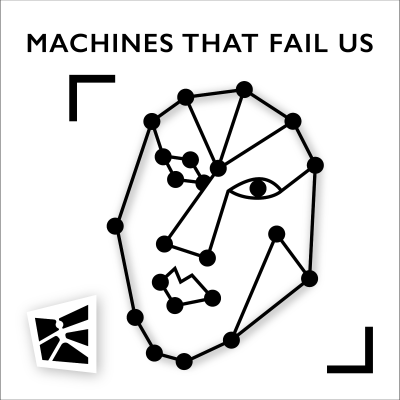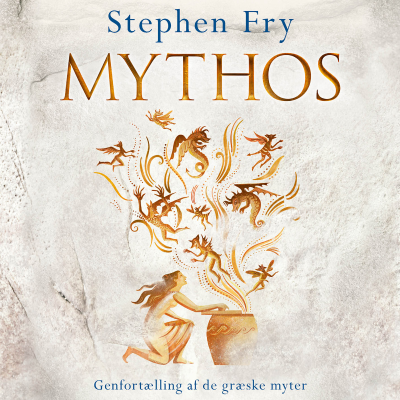
Machines that fail us
engelsk
Videnskab & teknologi
Begrænset tilbud
2 måneder kun 19 kr.
Derefter 99 kr. / månedOpsig når som helst.
- 20 lydbogstimer pr. måned
- Podcasts kun på Podimo
- Gratis podcasts
Læs mere Machines that fail us
From educational institutions to healthcare professionals, from employers to governing bodies, artificial intelligence technologies and algorithms are increasingly used to assess and decide upon various aspects of our lives. However, the question arises: are these systems truly impartial and just in their judgments when they read humans and their behaviour? Our answer is that they are not. Despite their purported aim to enhance objectivity and efficiency, these technologies paradoxically harbor systemic biases and inaccuracies, particularly in the realm of human profiling. “Machines That Fail Us” investigates how AI and its errors are impacting on different areas of our society and how different societal actors are negotiating and coexisting with the human rights implications of AI. The "Machines That Fail Us" podcast series hosts the voices of some of the most engaged individuals involved in the fight for a better future with artificial intelligence. The first season of "Machines That Fail Us" has been made possible thanks to a grant provided by the Swiss National Science Foundation (SNSF)’s "Agora" scheme, whereas the second one is supported by the University of St. Gallen’s Communications Department. The podcast is produced by the Media and Culture Research Group at the Institute for Media and Communications Management. Dr. Philip Di Salvo, the main host, works as a researcher and lecturer at the University of St.Gallen.
Alle episoder
10 episoderMachines That Fail Us - Season 2, Episode 5: "Heating Algorithms: AI and the Climate Crisis"
Artificial intelligence promises a smarter future, but at what cost? In this final episode of “Machines That Fail Us”, we take a look at the often-overlooked environmental footprint of AI’s relentless hunger for data and computing power. We discuss these issues with Noman Bashir, the Computing & Climate Impact Fellow at the MIT Climate & Sustainability Consortium and a researcher at the MIT Computer Science & Artificial Intelligence Laboratory.
Machines That Fail Us - Season 2, Episode 4: Creative Machines: Rethinking Art with AI
In this episode, we deal with the impacts of generative AI on art and aestethics, looking at how the rise and commercial success of tools such as Dall-E, Midjourney, and Sora have raised profound questions in the art world, and especially when it comes to visual arts. AI is reshaping how art is created, experienced, and valued. In this episode, we explore the opportunities and challenges artists face in collaborating with algorithmic tools, the ethical and creative questions emerging from machine-generated content, and the implications for authorship, originality, and cultural production. On one hand, we’ll focus on how artists can, and already do, use generative AI tools, exploring the results of these collaborations so far and examining how they differ from other historical moments when technology intersected with art. On the other hand, we’ll address ongoing debates in this field, starting with AI errors and the outcomes often referred to as “hallucinations,” and moving on to more systemic issues such as copyright, labor, and the flood of AI-generated images online, commonly known as “AI slop.” Finally, we’ll try to imagine how humans and machines might coexist in the future and consider, through art, what life with these creative machines could look like. In this episode of Machines That Fail Us, we discuss these issues with Valentina Tanni, an art historian and curator studying the relationship between art and technology, with particular attention to web cultures. She is currently at John Cabot University in Rome, Italy. In the past, she has also taught at La Sapienza University of Rome, the Polytechnic University of Milan, and NABA – New Academy of Fine Arts in Rome and Milan. She is the author of several books in this area: Memestetica. Il settembre eterno dell’arte (Nero, 2020); Exit Reality. Vaporwave, backrooms, weirdcore e altri paesaggi oltre la soglia (Nero, 2023); and her latest, Conversazioni con la macchina. Il dialogo dell’arte con le intelligenze artificiali (Tlon, 2025), which explicitly deals with the impact of generative AI on artistic practices. Her books have been translated into several languages and are distributed internationally.
Machines That Fail Us - Season 2, Episode 3: Who governs AI? Global challenges in addressing harm
In this episode, we delve into the global push to regulate artificial intelligence, as governments around the world are faced with the challenge to respond to its social and ethical challenges. With a focus on Latin America, Brazil in particular, we discuss how regulators are confronting the risks posed by deepfakes, online misogyny, and copyright violations, among other issues. AI regulation is rapidly becoming a global priority, as policymakers confront the ethical, legal, and societal consequences of increasingly powerful technologies. From misinformation to algorithmic discrimination, the risks posed by AI systems are no longer hypothetical; they are already influencing public discourse and challenging existing legal frameworks. In this episode, we turn our attention to Latin America, with a particular focus on Brazil, to understand how the region is responding to these challenges. These issues are not only technical but deeply social, intersecting with questions of gender, race, and power in digital spaces, and reminding us just how central and consequential AI "errors" can be. The debate currently unfolding in Brazil offers a lens into the broader struggle faced by many countries: how to assert digital sovereignty and protect their populations while keeping pace with a rapidly evolving technological landscape. In particular, we’ll examine how regulation must address some of the most insidious uses and misuses of AI, especially those connected to online misogyny. In this episode of Machines That Fail Us, we dive into this issue with Prof. Mariana Valente, who serves as an assistant professor at the Law School of the University of St. Gallen and is also a director and board member at Brazil’s InternetLab. Valente is a Brazilian lawyer and scholar, her work centers on the intersection of human rights and technology. Over the past decade, she has been actively engaged in research, writing, public speaking, and teaching on gender inequality in digital spaces, with a particular emphasis on online gender-based violence (OGBV) and the corresponding legal frameworks, policy responses, and law enforcement practices.
Machines That Fail Us - Season 2, Episode 2: "Teaching the Machine: The Hidden Work Behind AI’s Intelligence"
The training and coding of AI systems, particularly generative ones, depend on the work of humans teaching machines how to think. This work includes content moderation and labeling, is often conducted under exploitative conditions in the Global South, and remains hidden from users' view. In this episode, we discuss these issues with Adio Dinika, a Research Fellow at the Distributed AI Research Institute (DAIR), where he investigates the invisible labor behind AI systems and how it reflects the various inequalities within the AI industry. We often perceive AI tools as entirely artificial, if not almost magical. In reality, the effectiveness and reliability of these systems depend significantly on the labor of humans who ensure that generative AI tools, for example, produce responses that are moderated and free from harmful or toxic content. High-quality training data is essential for building a high-performing large language model, and this data is made up of precisely labeled datasets—a task still carried out by human workers. However, this work is predominantly performed by people in the Global South, often under exploitative and unhealthy conditions, and remains largely invisible to end-users worldwide. The roles of these invisible workers, along with the challenges they face, represent some of the most visible signs of inequality within the AI and tech supply chain, yet they remain little discussed. In this episode of Machines That Fail Us, we dive into this issue with Adio Dinika, a Research Fellow at the Distributed AI Research Institute (DAIR), an international research center focused on the social implications of AI, founded by Timnit Gebru. Together with Dr. Dinika, we explore the hidden human labor behind AI systems and the real, human nature of artificial intelligence.
Machines That Fail Us - Season 2, Episode 1: "Artificial Lies and Synthetic Media: How AI Powers Disinformation"
How is artificial intelligence being used for disinformation purposes? How effective can it be in influencing our reality and political choices? We discuss the rise of synthetic media with Craig Silverman, a reporter for ProPublica who covers voting, platforms, disinformation, and online manipulation, and one of the world’s leading experts on online disinformation. In the first season of Machines That Fail Us, our focus was to explore a fundamental question: what do AI errors reveal about their societal impact and our future with artificial intelligence? Through engaging discussions with global experts from journalism, activism, entrepreneurship, and academia, we examined how AI and its shortcomings are already influencing various sectors of society. Alongside analyzing present challenges, we envisioned strategies for creating more equitable and effective AI systems. As artificial intelligence becomes increasingly integrated into our lives, we decided to expand these conversations in the new season, delving into additional areas where machine learning, generative AI, and their societal effects are making a significant mark. This season begins by examining AI's role in the spread of misinformation, disinformation, and the ways generative AI has been used to orchestrate influence campaigns. Are we unknowingly falling victim to machine-generated falsehoods? With 2024 being a record year for global elections, we will explore the extent to which AI-driven disinformation has shaped democratic processes. Has it truly had an impact, and if so, how? In this episode, we are joined by Craig Silverman, an award-winning journalist, author, and one of the foremost authorities on online disinformation, fake news, and digital investigations. Currently reporting for ProPublica, Craig specializes in topics such as voting, disinformation, online manipulation, and the role of digital platforms.
Vælg dit abonnement
Begrænset tilbud
Premium
20 timers lydbøger
Podcasts kun på Podimo
Gratis podcasts
Opsig når som helst
2 måneder kun 19 kr.
Derefter 99 kr. / måned
Premium Plus
100 timers lydbøger
Podcasts kun på Podimo
Gratis podcasts
Opsig når som helst
Prøv gratis i 7 dage
Derefter 129 kr. / måned
2 måneder kun 19 kr. Derefter 99 kr. / måned. Opsig når som helst.

































